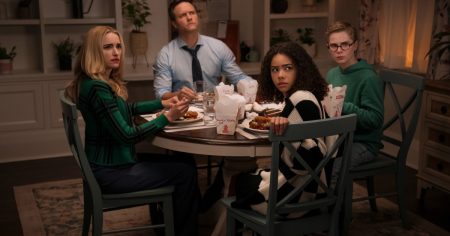Jennifer Lopez has recently shared her reflections on combating Latina stereotypes throughout her career, emphasizing her commitment to broadening the representation of Latinas in Hollywood. During her appearance on the “Variety Awards Circuit” podcast, Lopez expressed her desire to tackle the limited roles available to Latina actresses, which often relegated them to typecasts such as maids or store clerks. Her ambition as both an actor and producer has always been to forge paths that allow for a diversity of stories and characters that go beyond traditional stereotypes. Lopez stated that she aimed to not only break those molds but also to take the lead in projects that showcased more multifaceted Latina characters.
As Lopez recounted her early experiences in the industry, she noted the scarcity of roles available to Latina actresses, stating that most auditions pushed her toward accent-heavy, stereotypical characters. Her ultimate goal was to play romantic leads and relatable characters, similar to “the girl next door.” Despite the challenges, Lopez credits her determination and self-belief for breaking through the industry’s barriers. She recognized the internal struggle many face when feeling out of place, particularly when coming from underprivileged backgrounds. This journey of self-acceptance and the need to replace external voices of doubt with one’s own encouraging narrative was paramount for Lopez.
Growing up in the Bronx with Puerto Rican parents, Lopez described her early life as a struggle to fit in, often battling feelings of inadequacy. She acknowledged the psychological impact of feeling like an outsider, stating that the battle for self-acceptance often stems from one’s upbringing and environment. Lopez emphasized the importance of tuning into one’s inner voice, which can be influenced by family but should eventually evolve into one’s own affirmations of belonging, worth, and capability. She underlined the inherent difficulties of pursuing a career in the arts, where subjective judgments often lead others to undermine your talent and potential.
In her latest film, “Unstoppable,” Jennifer Lopez plays Judy Robles, the mother of wrestler Anthony Robles, who became a national champion despite being born with one leg. Lopez found a deep connection with Judy’s character, understanding the struggles and challenges that come with being a mother while striving to provide support and guidance to her child. She resonated with Judy’s desire to be the best mom possible, acknowledging the pressure and sacrifices that accompany motherhood. Lopez drew parallels between Judy’s journey and her own, specifically regarding the challenges faced by women as they navigate their personal and professional lives, often finding themselves playing adult roles long before they feel ready.
Lopez elaborated on the themes of resilience and perseverance present in both her life and the story of “Unstoppable.” The film chronicles the remarkable journey of overcoming adversity, reflecting the broader narratives of many women, particularly those from underrepresented backgrounds. As she navigated her path in Hollywood, Lopez developed a strong sense of responsibility toward representing her community authentically on-screen. Her work continues to challenge existing stereotypes while asserting that Latina voices and stories deserve to be told in nuanced and powerful ways.
Ultimately, Jennifer Lopez’s narrative shapes a broader dialogue about representation in the arts, where the struggle to break free from stereotypes is both a personal and collective battle. Her experiences underscore the importance of storytelling that reflects diverse cultural backgrounds and experiences, thus paving the way for future generations of artists. Lopez’s commitment to authenticity and empowerment not only serves as an inspiration to others aspiring to break barriers, but it also reinforces the notion that everyone deserves to see their stories and identities represented on screen.










